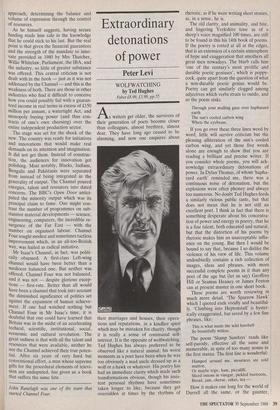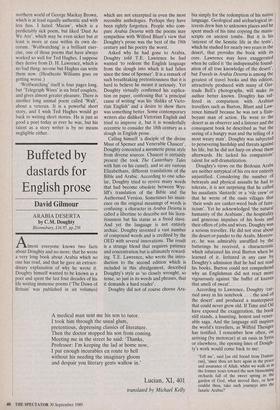Extraordinary detonations of power
Peter Levi
WOLFWATCHING by Ted Hughes
Faber f8.99, f3.99, pp.55
As writers get older, the survivors of their generation of poets become closer than colleagues, almost brethren, almost dear. They have long ago ceased to be alarming, and now one enquires about
their marriages and houses, their opera- tions and reputations, in a kindlier spirit which may be mistaken for charity, though it is really a sense of communal self- interest. It is the opposite of wolfwatching. Ted Hughes has always preferred to be observed like a natural animal; his worst moments as a poet have been when he was too obviously a mad uncle dressed up as a wolf or a hawk or whatever. His poetry has had an immediate clarity which made such transformations obvious, though his insis- tent personal rhythms have sometimes taken longer to like, because they get overridden at times by the rhythms of rhetoric, as if he were writing short stories, as, in a sense, he is.
The old clarity, and animality, and bite, and lingering Yorkshire tone as of a sheep's voice magnified 100 times, are still to be found in this his 14th book of poems. If the poetry is rotted at all at the edges, that is an extension of a certain atmosphere of hype and exaggeration that smothers all great men nowadays. The blurb calls him `one of the century's most prolific and durable poetic geniuses', which is poppy- cock, quite apart from the question of what a non-durable poetic genius would be. Poetry can get similarly clogged among adjectives which verbs strain to outdo, and so the poem sinks.
Through your mulling gaze over haphazard earth The sun's cooled carbon wing Whets the eyebeam.
If you go over these three lines word by word, little will survive criticism but the pleasing alliteration of the sun's cooled carbon wing, and yet those five words alone are enough to show that you are reading a brilliant and precise writer. If you consider whole poems, you will ack- nowledge extraordinary detonations of power. In Dylan Thomas, of whom 'hapha- zard earth' reminded me, there was a continuous noise of detonation, but the explosions were often phoney and always too numerous. No doubt Ted Hughes feeds a similarly vicious public taste, but that does not mean that he is not still an excellent poet. I think in fact that there is something desperate about his concentra- tion of power and energy in poetry, that he is a fine talent, both educated and natural, but that the distortion of his poems by rhetoric makes him an unacceptable influ- ence on the young. But then I would be bound to say that, because I so dislike the violence of his view of life. This volume undoubtedly contains a rich collection of images, ideas and phrases, with more successful complete poems in it than any poet of the age but (let us say) Geoffrey Hill or Seamus Heaney or James Fenton can at present muster in one short book. These poems are worth reviewing in much more detail. 'The Sparrow Hawk' which I quoted ends vividly and beautiful- ly. 'Climbing into Heptonstall' is hyster- ically exaggerated, but saved by a few fine phrases, like: This is what made the wild harebell So beautifully witless.
The poem 'Slump Sundays' reads like self-parody, effective all the same and memorable, in spite of too many nouns in the first stanza. The first line is wonderful: Humped around me, mourners ate cold mutton, Or maybe tripe, ham, piccalilli, Sliced onions in vinegar, pickled beetroots, Bread, jam, cheese, cakes, tea -
How it makes one long for the world of Durrell all the same, or the gaunter, northern world of George Mackay Brown, which is at least equally authentic and with less fuss. I hated 'Macaw', which is a predictably sick poem, but liked 'Dust As We Are', which may be even sicker but at least is more at ease within its own de- corum. 'Wolfwatching' is a brilliant exer- cise, one of those poems that have always worked so well for Ted Hughes. I suppose they derive from D. H. Lawrence, which is no bad thing: no-one but Hughes can write them now. (Heathcote Williams goes on getting worse.) `Wolfwatching' itself is four pages long, but 'Telegraph Wires' is six brief couplets, and gives almost greater pleasure. There is another long animal poem called 'Walt', about a veteran. It is a powerful short story, and I wish Ted Hughes would go back to writing short stories. He is just as good a poet today as ever he was, but his talent as a story writer is by no means negligible either.



























































 Previous page
Previous page